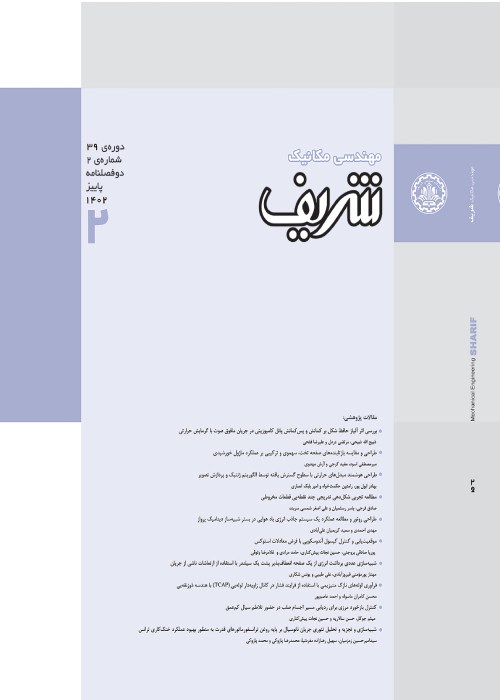Experimental investigation and analysis of combustion properties and chemical-physical properties of nano-fuel using hybrid nanostructure additives
Author(s):
Article Type:
Research/Original Article (دارای رتبه معتبر)
Abstract:
Nanostructured additives have been widely used in various industries especially power industry in order to decrease both specific fuel consumption (fuel consumption per unit of electricity production, SFC) and pollutants emission. The most important fuel properties are fuel density, kinematic viscosity, flash point, cetane number, and calorific value. Calorific value of a fuel is the thermal energy released per unit quantity of fuel when the fuel is burned completely and the products of combustion are cooled back to the initial temperature of the combustible mixture. It measures the energy content in a fuel. The calorific value of a fuel can be measured in a bomb calorimeter. The most frequently used fuel additives for diesel engines are oxygenated additives, antioxidants, cold flow improvers, lubricity improvers, cetane improvers, metal-based additives, and nanomaterials. In recent years, various nanomaterials, acting as diesel engine fuel additives, gained substantial attention. According to investigation results obtained so far, these additives look to be extremely promising. This follows from the wide range of options they offer in influencing practically all important engine characteristics by affecting many processes from fuel combustion to exhaust treatment. In this study, hybrid nanoparticles were dispersed in mazut and diesel fuels as hybrid nanofuels and the physico-chemical properties of manufactured nanofuels were evaluated. Dispersion of the nanoparticles were carried out in two stages. They were weighed and mixed to surfactants and added to fuel. Then the mixture was dispersed by using an ultrasonic device.The results indicated that the rate of calorific values of mazut-based nanofuels and diesel-based nanofuels were improved to 13.41% and 14.02%, respectively, in proportion to pure mazut and pure diesel fuels. Therefore, metal oxide nanoparticles and multi-walled carbon nanotubes had a remarkable impact on combustion properties of fuels. The final price of nanofuel was up to 20-30% more than pure fuels which can be reduced when nanofules are produced in large scale. It can be concluded that the optimized samples of mazut-based and diesel-based nanofuels had all properties of an ideal fuel for using in a combustion process and could be considered as suitable alternatives to pure mazut and pure diesel fuels.
Keywords:
Language:
Persian
Published:
Mechanical Engineering Sharif, Volume:39 Issue: 1, 2023
Pages:
55 to 67
magiran.com/p2596737
دانلود و مطالعه متن این مقاله با یکی از روشهای زیر امکان پذیر است:
اشتراک شخصی
با عضویت و پرداخت آنلاین حق اشتراک یکساله به مبلغ 1,390,000ريال میتوانید 70 عنوان مطلب دانلود کنید!
اشتراک سازمانی
به کتابخانه دانشگاه یا محل کار خود پیشنهاد کنید تا اشتراک سازمانی این پایگاه را برای دسترسی نامحدود همه کاربران به متن مطالب تهیه نمایند!
توجه!
- حق عضویت دریافتی صرف حمایت از نشریات عضو و نگهداری، تکمیل و توسعه مگیران میشود.
- پرداخت حق اشتراک و دانلود مقالات اجازه بازنشر آن در سایر رسانههای چاپی و دیجیتال را به کاربر نمیدهد.
In order to view content subscription is required
Personal subscription
Subscribe magiran.com for 70 € euros via PayPal and download 70 articles during a year.
Organization subscription
Please contact us to subscribe your university or library for unlimited access!



